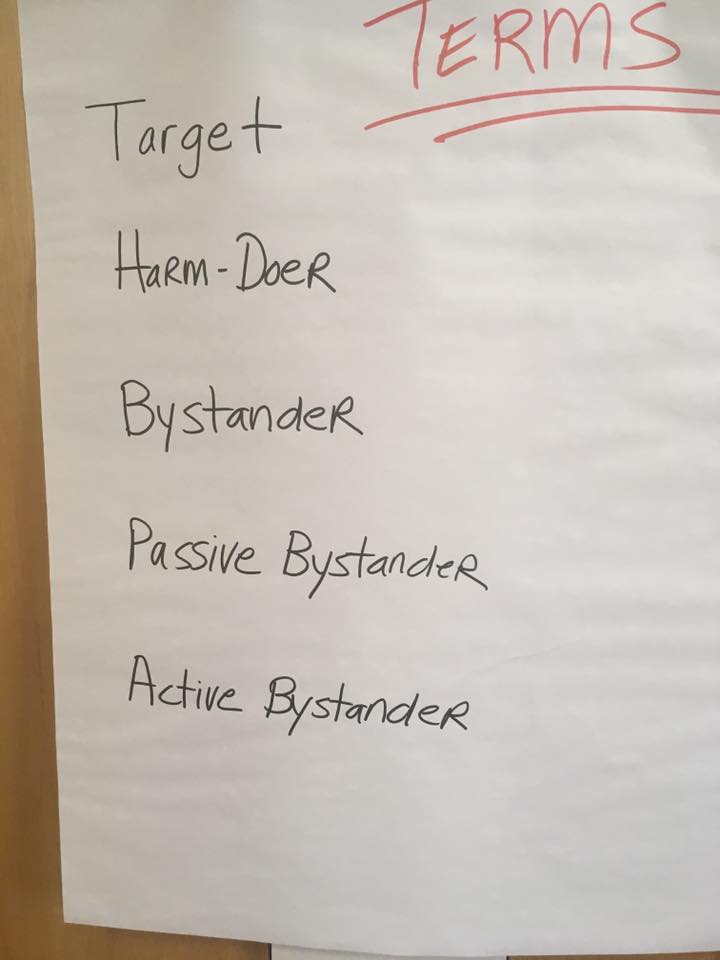On Sunday afternoon, August 6, we hosted an Active Bystander Training at Trinity Church: "Creating Safety in Contentious Times"
We learned about harm-doers, targets, and active or passive bystanders. The creators of this program avoid the terms "bully" and "victim" because those are labels. The training addresses situational behavior, not persons. Harm can be done unintentionally, and someone who has harmed someone else with words or actions (every single one of us) is not necessary a bully or a bad person. Nor is a target of harm-doing always a victim.
We talked about "inhibitors": What keeps people from getting involved? (Factoid: The more people witness an incident, the less likely that anyone will get involved.)
And how can we get involved, be effective and remain safe?
I cannot present all the content of the program here. I strongly encourage you to register when we offer another training in the fall. This program is appropriate for teens and adults.
Also look on Trinity Church's facebook page for photos of the posters we referred to.
Two of the main take-aways that I heard from others were:
1 Focus on the target, not the harm-doer, and make sure that the target is supported and knows they are not alone. Ask them before you take any action steps. Even just sitting next to them or engaging them in conversation may divert the harm-doer.
2 Have empathy for the harm-doer. Understand that they are acting out of a place of hurt, not evil.
I am convinced if we all learned and applied these techniques in every day life, we would make the world a better and safer place, one small step at a time.
On Monday, August 7, I was able to attend a Workshop on Difficult Behaviors: "That Pushes My Buttons"
The presenter based his strategy on systems theory which teaches that all groups of people are a system: Each element (person) in that system has a function and they all interact with and affect each other. So what one person does, says or even feels, affects all other persons in that system (family, church, you name it).
Churches are either a "survival of the fittest" system, where a few people have power and control and others have no voice and accommodate, or show passive-aggressive behavior.
Other churches are a "we're in this together" system of equals where all are respected, have access to power, and a voice.
Needless to say, the latter is a safer and more humane environment.
Examples of "difficult behavior" are aggressive, critical, controlling, degrading, negative, or polarizing.
We took a closer look at the "buttons" we have that other people push and that make us react with "fight or flight" mode. Difficult behavior triggers reactivity in us because it takes us back to a difficult time in our own emotional history. We might feel we are not valued or not loved, that something is wrong with us, that we have to fight hard to win, that our needs will not be met, that we are alone or cannot handle any given situation.
Instead of trying to control the person whose behavior we experience as difficult (and whom we cannot control), we can get to know and shrink our own buttons, making them harder to push. This can be accomplished by developing anti-buttons: "I am valued. I have power and a voice. I can be myself. I am loved. My needs are being met. I can be alone or with others as I choose. I can handle challenges."
Again, I cannot go into every detail of the program. What struck me is that everything starts with ME (or, as you are reading this: you). How do I react to others' behavior, and why? How can I change my own emotional and verbal reaction? How can I have more compassion for the person that I find to be exhibiting difficult behavior?
Eleanor Roosevelt said, "No one can make you feel inferior without your consent." If none of us felt inferior as a consequence of other people's behavior, we in turn would not need to make someone else feel inferior and we would indeed live in a safer and more humane environment.
Another aspect of starting with ME is asking: What can I do so that we as a church become a place where everyone feels that "we are in this together?" Instead of falling back into the "us versus them" mentality: My supporters and my critics; men and women; Republicans and Democrats; young people and old people; Christians and Muslims, etc. When really there is only an US: the human race.
At one point during the workshop we were given a few seconds to write our own personal mission statement. This is what I came up with:
"I'm a pastor because I get to inspire, encourage, challenge, empower and comfort people, and help them to experience that they are God's beloved."
Even after having thought about it more, I wouldn't change a thing.
I thank God every day for opportunities to learn and grow as an individual, and as your pastor!


No comments:
Post a Comment
Note: Only a member of this blog may post a comment.